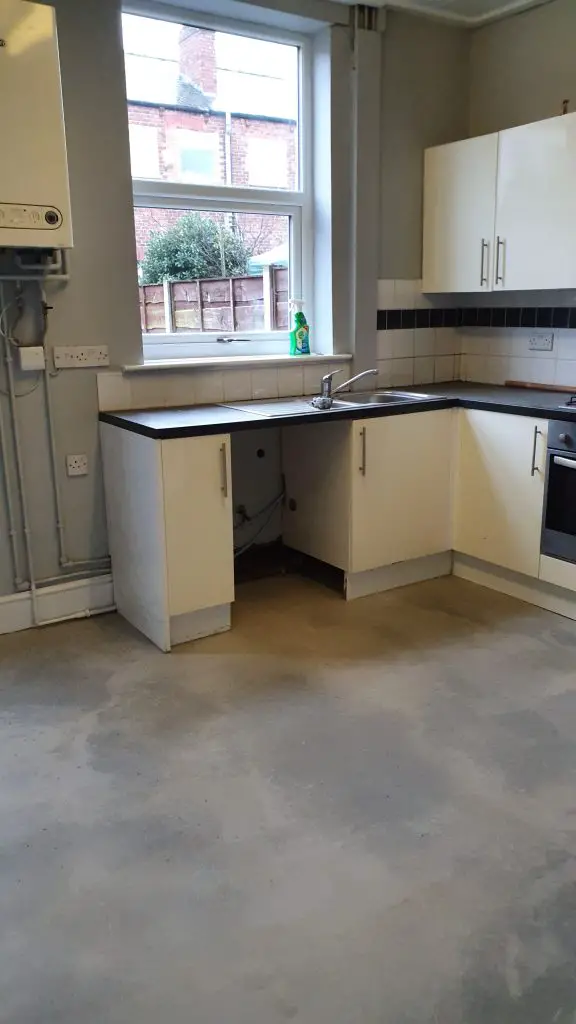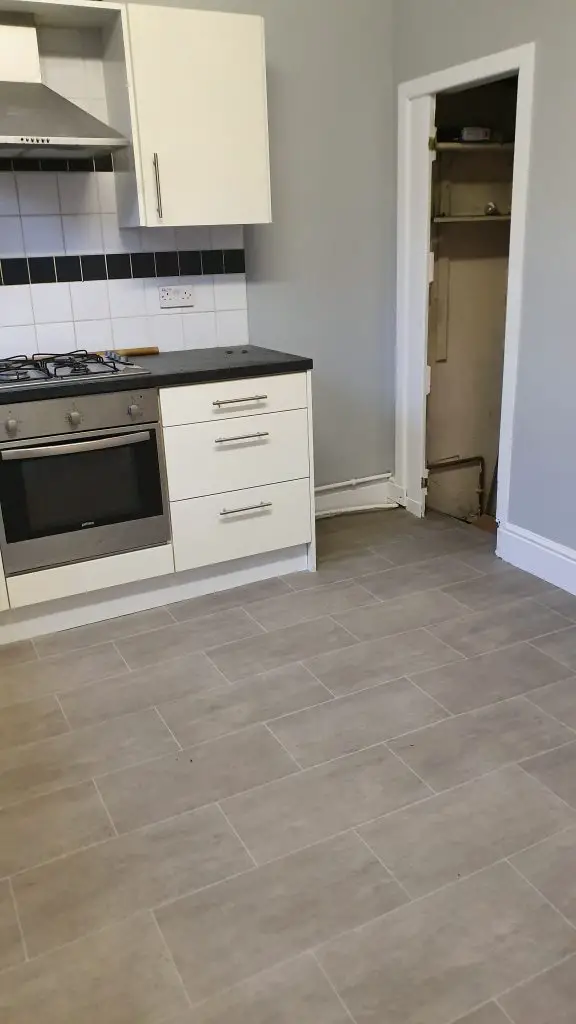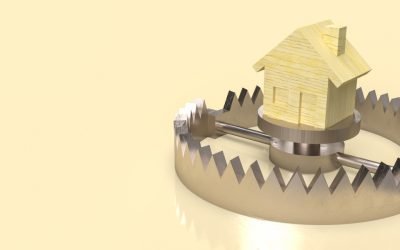As a landlord, you are responsible for maintaining your rental property in a liveable condition. This includes keeping the kitchen in good repair. Many landlords wonder how often they should replace elements of the kitchen, such as appliances, countertops and flooring.
A landlord should consider replacing the kitchen every 10 to 15 years. This is because kitchens are prone to wear and tear from heavy use and regular cleaning.
Take that with a pinch of salt as there are a lot of factors involved, such as the quality of the kitchen you have fitted and the type of tenants you’re renting to. In properties we’ve rented for a very long time to the same person or family we’ve had 20+ years out of a kitchen before major work was required.
Also, sometimes it’s possible to refurbish a kitchen rather than replace it. We have sometimes have been able to change the doors of the kitchen units rather than replacing the whole kitchen. It’s important to make sure the kitchen looks good but it must make financial sense to replace the whole thing.
Kitchens are one of the most important rooms in any house. It can influence potential tenants’ decisions to rent the property as it’s one of the most used rooms. As such, it’s important to maintain them well so that they remain usable and attractive.
When it comes to replacing kitchens, landlords often have two options: replace the entire kitchen or only replace elements such as the appliances.
Replacing the entire kitchen doesn’t always mean removing the old cabinets, if the main units are a standard size simply replacing the doors can do wonders.
Replacing kitchens every 10 to 15 years is an average which can be extended if the kitchen is made to be durable and is well maintained.
Kitchens are a high-traffic area in any home, so it’s important that they are able to withstand a lot of wear-and-tear.
It’s important to note that not all tenants are as interested in taking care of things as landlords are, so opting for the right balance of cost and durability is important. Cheaper might not be wise in the long run as fixtures might break more easily under tenant care.
What is the average lifespan of a kitchen?
Kitchens are a high traffic area. They’re used daily and therefore are one of the key rooms potential tenants will look closely at when considering if they wish to rent from you.
The average lifespan of a kitchen is about 10 to 15 years, that’s assuming you’ve fitted a good quality kitchen and that tenants take care of it (not always the case when they’ve not had to pay for it!).
Choosing the right materials can help extend this to 20+ years, for example using hard-wearing flooring, non-scratch surfaces, and durable materials.
It’s very tempting to go for the cheapest possible option, and depending on your renovation budget that might be the only option you have. However, be mindful that low-cost fixtures are sometimes also low quality and may not last as long as ones with more durability in the hands of tenants; tenants are not as invested in ‘looking after things’ so will break them easily if they’re cheaply made.
Over the years we’ve found Ikea kitchens to be an excellent option, providing the perfect balance between quality, style and cost. They also do an interest free credit option which is fantastic as you can pay for that on a monthly basis when the rent is paid.
Keep in mind that appliances, such as cookers, will have their own lifecycle, and you’ll need to supply new appliances when old ones die out. These days we are trying to not provide white goods as they are very expensive and tenant’s usually have their own appliances.
What’s the ROI on a kitchen remodel?
Kitchen remodels are a big investment, but they can be worth it in the long run. Not only do they increase the value of your home, but they also make it more comfortable and functional to live in, which makes it more attractive to potential tenants.
If you’re thinking about renovating your kitchen, here are some things to keep in mind:
A kitchen renovation can add a lot of value to your home.
Not only does it make the property more comfortable and functional to live in, but it can also increase its value on the market, both rental and if up for sale.
As a private landlord the house value might not be at the forefront of your thinking, but when it’s time to sell, having a kitchen in good condition helps with the valuation and makes the property more attractive.
However, not all renovations are created equal.
There is a balancing act as a property investor. On the one hand you want to provide a good value property that commands a decent rental price and on the other you don’t want to be spending a fortune if you don’t need to.
The conundrum is this, if you spend too little you can end up with a poor quality kitchen that is not only off-putting to potential tenants, but also requires above average maintenance work in the long run. This additional work not only costs you money, but also causes inconvenience to your tenants.
On the other hand, if you go all out and spend a fortune you could end up with an amazing kitchen that someone else benefits from, and it takes a long time to see any return on the investment. I remember when we first got into property investing, we were waiting to replace the kitchen in our own home and we had to put a new one in a rental property. I was thinking that the tenants had a better kitchen than us!
Try to find a good balance between quality and affordability that works for you and the property you’re renting. For example, a low-cost student property would be better served by a basic low-cost kitchen, whereas long-term tenants would expect higher quality.
One of our rentals became empty and when we went to inspect the property we found the kitchen looking like this:

It was in a pretty sorry state, but that was mainly due to the tenant’s clutter. On further inspection we realised that we could just refurb the property and not replace the whole kitchen. After refurbishment the kitchen looked like this:


Think about how long you plan on owning the property.
If you’re only going to rent for a few years before selling, don’t invest too much money into renovating the kitchen else you won’t see a return on your investment.
The kitchen and bathroom are two key rooms people look at to decide the value of a house as they’re usually the most expensive rooms to renovate.
You want the kitchen to be in good enough condition that it doesn’t need replacing immediately on purchase. If it is tatty, dated, tired looking and obviously needs replacing I guarantee you’ll have offers under the asking price.
How often should a landlord replace a kitchen appliance?
The general guidance is that the landlord should carry out repairs within a “reasonable” amount of time. The reasonable amount of time will depend on what work needs to be done and how quickly it must be done.
If electrical appliances are coming to the end of their life thanks to normal wear and use, then there is no urgency. However, if your tenant reports a broken appliance then this should be addressed as soon as possible.
Providing more appliances might make it a more attractive property but it also increases your upfront and ongoing maintenance costs.
Consider who the property is aimed at and if they require everything you might have in your own home. When I rented a house at university it had a cooker but no washing machine, tumble dryer or dishwasher.
Instead, I had to head to the local laundrette and do the dishes by hand. That was fine when I was a student, but now I’d want all of those appliances in my home.
If you don’t want to buy the products, you could at least ensure there is space for them if the tenant wishes to provide their own.
Interestingly a recent YouGov poll revealed that when asked to pick between a dishwasher or tumble dryer it was very even, with 47% choosing a dishwasher, 44% picking a tumble dryer and 9% didn’t know.

How often should a landlord replace a kitchen sink?
Landlords should consider replacing their kitchen sink whenever the kitchen is remodelled, or sooner if it becomes damaged.
The sink would usually be replaced during an overall kitchen renovation. They’re typically very hard wearing and can usually last for a lot longer, but if you’re having a new kitchen you don’t want the look spoiled by an obviously old, well-used sink.
To keep the kitchen looking fresh without a full renovation, you might consider replacing the taps, but leave the sink. This can help give a sense of freshness for both current tenants and future tenants. As I said earlier, it’s all about the balance. There are some simple things that you can do to make the kitchen look better without spending a fortune!
How often should a landlord replace a kitchen countertop?
If you’ve got a countertop that is very hard wearing and remains in good condition, you may not need to replace it for over 20 years.
If you’re not changing the layout of the kitchen it can remain in place. Usually it’s possible to refresh a kitchen by swapping out the old cupboard doors for new ones.
How often should a landlord replace a kitchen backsplash?
Kitchen backsplashes are often one of the first things to show wear and tear, so it’s important for landlords to keep an eye on them and replace them if necessary.
They’re located in what is usually a high use area that has a lot of foodstuff and spitting oils and if the tenants don’t take care to keep the area clean it can become very unpleasant.
This is one area to check out and refresh whenever you’ve a void period, either via a deep clean or via a full replacement.
How often should a landlord replace a kitchen floor?
A good, hard wearing, kitchen floor can last a lifetime, and so many not need to be replaced as frequently as other elements of the kitchen.
There are lots of different kitchen floor types, for example tiles, laminate, wood etc., and each type will have its own lifespan.
Each floor type can be damaged in different ways, for example tiles can become cracked, laminate can be ripped etc.
If you’re making changes to your kitchen layout, you may find you need to replace the flooring anyway. At this point I’d recommend fitting a strong lino. You don’t want to spend too much money on the flooring but you need something that is hard wearing. Lino will do the job really well.

How often should a landlord replace a kitchen window?
It’s becoming more uncommon to find properties without modern double-glazed windows. If you happen to find an investment opportunity that has very old style wooden windows then replacing them will be one of the higher costs of the project.
Modern double or triple glazed windows are typically covered by a 10-year fitter guarantee backed up by a FENSA Window Guarantee lasting 5 to 10 years. This means that if the fitter ceases to trade the FENSA guarantee kicks in for the remainder of the guarantee period.
Just because the guarantee is 10 years doesn’t mean the windows need replacing every 10 years. In fact most modern windows will easily last 20+ years, even in a rental property where many people move in and out.
As with other aspects of the kitchen, if it is damaged it should be addressed as soon as possible to keep the property secure. If it needs minor work doing, for example replacing the glass which has become compromised, this can be scheduled in as part of the general maintenance and repair responsibilities you have.
A full replacement would ideally be carried out when the property is empty, along with any other major kitchen work taking place.
How often should a landlord replace a kitchen door?
Internal and external doors generally don’t need to be replaced unless there is a problem with them. They’re generally very long-lasting and don’t take much damage.
For internal doors, rather than replacing why not consider giving it a refresh? A coat of paint and new door handles can revitalise a tired looking door.
If there is a situation where doors need to be replaced the priority should always be the external door as that provides security for the house and the tenants.
Internal doors are much lower priority, and any issues are usually quick and easy to resolve, either by yourself or by your handyman. However, if there is a glass panel in an internal door it’s best to replace those as it could be a hazard for tenants, particularly those with children.
How often should a landlord replace a kitchen light fixture?
Like doors, light fixtures tend to last a very long time. There are generally only two reasons I’d replace these:
1) It’s no longer working
2) It looks very dated
With modern LED lighting you don’t even need to change bulbs as often as you once did! My advice is to install lighting fixtures that are neutral in design, rather than something very fancy looking that could polarise opinions.
How often should a landlord replace a kitchen tap?
Of all the elements in a kitchen, the humble tap is the one thing that needs attention more than most. Taps are used every day and are by far the most common item that need replacing.
This is one area I’d strongly suggest you don’t go super cheap on, the last thing you want is a call to say the kitchen has been flooded because the cheap tap has leaked while the tenant was at work.
You should certainly replace them during any kitchen renovation, otherwise check them during every maintenance check, ensuring they’re not dripping and are in good condition.
Summary
So, in summary I recommend analysing the overall price of the property to see how much you need to spend on a kitchen. If it is a high value property then you need to have a luxury kitchen fitted. If it is a 2 up 2 down terraced then a more basic simple kitchen will suffice.
The golden rule is to remember that you aren’t living in the property, so don’t get emotionally attached. Choose the kitchen wisely and it will last a long time but not cost you a fortune. It’s all about the ROI of the property so make sure you do your calculations prior to the purchase.
Source: https://d25d2506sfb94s.cloudfront.net/cumulus_uploads/document/63wspcjn4a/InternalResults_170807_UtilityFight_W.pdf
https://www.fensa.org.uk/youve-got-your-windows-in
- Rent-to-Rent Schemes: Hidden Dangers Lurk - July 6, 2024
- How to Sell Your House Fast in Kent - July 5, 2024
- 7 Tips to Sell Your House Fast - July 4, 2024


